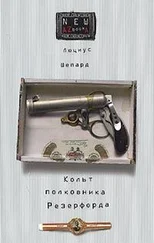The lights burned in his eyes, winking bright, and—as if in correspondence to their brightness—my dizziness increased. “Tell me about it,” I said, trying to take my mind off the discomfort.
“I’d be delighted!” He grinned nastily. “But not now. It’s too complicated. Tonight, man. I’ll send you a dream tonight. A bad dream. That’ll satisfy your curiosity.”
My head was spinning, my stomach abubble with nausea. “Lemme go, Stoner,” I said.
“Isn’t this good for you, man? It’s very good for me.” With a flick of his hand, he released my wrist.
I braced myself to keep from falling over, drew a deep breath, and gradually my strength returned. Stoner’s eyes continued to burn, and his features maintained their coarsened appearance. The difference between the way he looked now and the lost soul I had first seen was like that between night and day, and I began to wonder whether or not his touching me and my resultant weakness had anything to do with the transformation. “Part of your process,” I said. “Does that…”
He looked me straight in the eyes, and I had the impression he was cautioning me to silence. It was more than a caution: a wordless command, a sending. “Let me explain something,” he said. “A ghost is merely a stage of growth. He walks because he grows strong by walking. The more he walks, the less he’s bound to the world. When he’s strong enough”—he made a planing gesture with his hand—“he goes away.”
He seemed to be expecting a response. “Where’s he go?” I asked.
“Where he belongs,” he said. “And if he’s prevented from walking, from growing strong, he’s doomed.”
“You mean he’ll die?”
“Or worse.”
“And there’s no other way out for him?”
“No.”
He was lying—I was sure of it. Somehow I posed for him a way out of Cam Le. “Well…so,” I said, flustered, uncertain of what to do and at the same time pleased with the prospect of conspiring against Tuu.
“Just sit with me awhile,” he said, easing his left foot forward to touch my right ankle.
Once again I experienced weakness, and over the next seven or eight hours, he would alternately move his foot away, allowing me to recover, and then bring it back into contact with me. I’m not certain what was happening. One logic dictates that since I had been peripherally involved in his death—“part of his process”—he was therefore able to draw strength from me. Likely as not, this was the case. Yet I’ve never been convinced that ordinary logic applied to our circumstance: it may be that we were governed by an arcane rationality to which we both were blind. Though his outward aspect did not appear to undergo further changes, his strength became tangible, a cold radiation that pulsed with the steadiness of an icy heart. I came to feel that the image I was seeing was the tip of an iceberg, the perceptible extremity of a huge power cell that existed mainly in dimensions beyond the range of mortal vision. I tried to give the impression of an interview to our observers by continuing to ask questions; but Stoner sat with his head down, his face hidden, and gave terse, disinterested replies.
The sun declined to the tops of the palms, the yellow paint of the houses took on a tawny hue, and—drained by the day-long alternation of weakness and recovery—I told Stoner I needed to rest. “Tomorrow,” he said without looking up. “Come back tomorrow.”
“All right.” I had no doubt that Tuu would be eager to go on with the experiment. I stood and turned to leave; but then another question, a pertinent one, occurred to me. “If a ghost is a stage of growth,” I said, “what’s he grow into?”
He lifted his head, and I staggered back, terrified. His eyes were ablaze, even the whites winking with cold fire, as if nuggets of phosphorus were embedded in his skull.
“Tomorrow,” he said again.
* * *
During the debriefing that followed, I developed a bad case of the shakes and experienced a number of other, equally unpleasant, reactions; the places where Stoner had touched me seemed to have retained a chill, and the thought of that dead hand leeching me of energy was in retrospect thoroughly repellent. A good many of Tuu’s subordinates, alarmed by Stoner’s transformation, lobbied to break off the experiment. I did my best to soothe them, but I wasn’t at all sure I wanted to return to the village. I couldn’t tell whether Tuu noticed either my trepidation or the fact that I was being less than candid; he was too busy bringing his subordinates in line to question me in depth.
That night, when Fierman broke out his whiskey, I swilled it down as if it were an antidote to poison. To put it bluntly, I got shit-faced. Both Fierman and Witcover seemed warm human beings, old buddies, and our filthy yellow room with its flickering lamp took on the coziness of a cottage and hearth. The first stage of my drunk was maudlin, filled with self-recriminations over my past treatment of Stoner: I vowed not to shrink from helping him. The second stage… Well, once I caught Fierman gazing at me askance and registered that my behavior was verging on the manic. Laughing hysterically, talking like a speed freak. We talked about everything except Stoner, and I suppose it was inevitable that the conversation work itself around to the war and its aftermath. Dimly, I heard myself pontificating on a variety of related subjects. At one point Fierman asked what I thought of the Vietnam Memorial, and I told him I had mixed emotions.
“Why?” he asked.
“I go to the Memorial, man,” I said, standing up from the table where we had all been sitting. “And I cry. You can’t help but cryin’, ’cause that”—I hunted for an appropriate image—“that black dividin’ line between nowheres, that says it just right ’bout the war. It feels good to cry, to go public with grief and take your place with all the vets of the truly outstandin’ wars.” I swayed, righted myself. “But the Memorial, the Unknown, the parades… basically they’re bullshit.” I started to wander around the room, realized that I had forgotten why I had stood and leaned against the wall.
“How you mean?” asked Witcover, who was nearly as drunk as I was.
“Man,” I said, “it’s a shuck! I mean ten goddamn years go by, and alla sudden there’s this blast of media warmth and government-sponsored emotion. ‘Welcome home, guys,’ ever’body’s sayin’. ‘We’re sorry we treated you so bad. Next time it’s gonna be different. You wait and see.’” I went back to the table and braced myself on it with both hands, staring blearily at Witcover: his tan looked blotchy. “Hear that, man? ‘Next time.’ That’s all it is. Nobody really gives a shit ’bout the vets. They’re just pavin’ the way for the next time.”
“I don’t know,” said Witcover. “Seems to—”
“Right!” I spanked the table with the flat of my hand. “You don’t know. You don’t know shit ’bout it, so shut the fuck up!”
“Be cool,” advised Fierman. “Man’s entitled to his ‘pinion.”
I looked at him, saw a flushed, fat face with bloodshot eyes and a stupid reproving frown. “Fuck you,” I said. “And fuck his ‘pinion.” I turned back to Witcover. “Whaddya think, man? That there’s this genuine breath of conscience sweepin’ the land? Open your goddamn eyes! You been to the movies lately? Jesus Christ! Courageous grunts strikin’ fear into the heart of the Red Menace! Miraculous one-man missions to save our honor. Huh! Honor!” I took a long pull from the bottle. “Those movies, they make war seem like a mystical opportunity. Well, man, when I was here it wasn’t quite that way, y’know. It was leeches, fungus, the shits. It was searchin’ in the weeds for your buddy’s arm. It was lookin’ into the snaky eyes of some whore you were bangin’ and feelin’ weird shit crawl along your spine and expectin’ her head to do a Linda Blair three-sixty spin.” I slumped into a chair and leaned close to Witcover. “It was Mordor, man. Stephen King-land. Horror. And now, now I look around at all these movies and monuments and crap, and it makes me wanna fuckin’ puke to see what a noble hell it’s turnin’ out to be!”
Читать дальше






